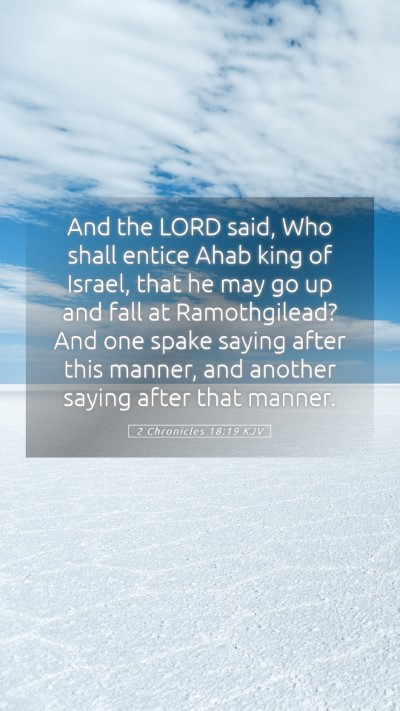Understanding 2 Chronicles 18:19
Bible Verse: “And the LORD said, Who shall entice Ahab king of Israel, that he may go up and fall at Ramoth-gilead? And one spake saying after this manner, and another saying after that manner.” (2 Chronicles 18:19)
Bible Verse Explanation
This verse takes place in a context that shows the interaction between divine will and earthly affairs. Here, God is seeking an agent to entice Ahab, which reflects the profound principles of free will, divine sovereignty, and judgment.
Comments from Public Domain Commentaries
-
Matthew Henry:
Henry emphasizes the gravity of Ahab's impending doom, noting that God is not the author of evil but uses the actions of others to accomplish His purposes. The reference to various spirits responding to God illustrates the divine council's dynamic and the seriousness of the prophetic task at hand.
-
Albert Barnes:
Barnes highlights the nature of Ahab's character and his relationship with God—one of rebellion and disobedience. God’s inquiry about who would entice Ahab to judgment reflects both divine justice and the complexity of human choices, warning us about the consequences of leading a life away from God's laws.
-
Adam Clarke:
Clarke discusses the significance of “enticing” Ahab, interpreting it as a way to draw him into a trap due to his own desires and pride. This suggests that while God delivers judgments, human actions can lead to divine responses, and thus stresses the importance of alignments in character reflective of God's will.
Insights on Biblical Exegesis
This verse illustrates the processes of divine communication and the role of prophets. It showcases how God might employ various means to accomplish His will on earth. From a contemporary perspective, this teaches the necessity of discernment in our spiritual walk, and listening to God's voice in a world filled with competing messages.
Application of the Verse to Daily Life
Understanding Scripture like this encourages believers to examine their lives closely. A reflection on personal motives and desires is essential in preventing the entrapments that come from worldly approaches to power and influence. It serves to remind believers that even in our agency, we should seek alignment with God's purposes.
Cross References
- 1 Kings 22:20-23 - Discusses God's inquiry and the role of lying spirits.
- Ezekiel 14:9 - Addresses how false prophets can lead people astray.
- James 1:13 - Clarifies that God does not tempt anyone, linking to the notion of divine communication and human vulnerability to sin.
Conclusion
The verse presents the intricate relationship between God's sovereignty and human responsibility. Ahab's story serves as a cautionary tale highlighting the consequences of rejecting divine guidance. As one engages in Bible study, insights derived from commentaries can greatly enrich our Bible verse understanding and interpretations.
In conclusion, 2 Chronicles 18:19 offers deep lessons on divine judgment, human agency, and the prophetic role that continues to resonate through generations. This verse reminds us of the importance of adhering to God's will as we navigate our spiritual journeys.


